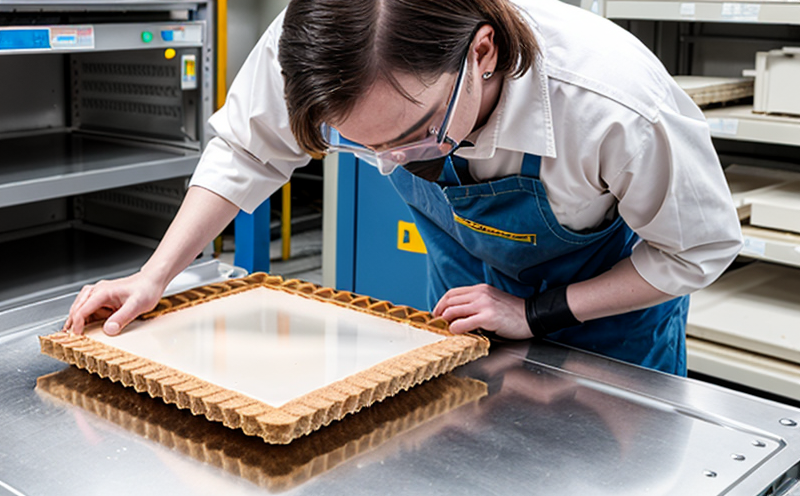ASTM F651 Wafer Surface Adhesion Testing
The ASTM F651 test method is a critical procedure used in semiconductor and microchip manufacturing to ensure the integrity of wafer surface adhesion. This testing ensures that thin films, metallizations, or other materials adhere securely to the substrate, which is crucial for maintaining product quality and reliability throughout the entire lifecycle of semiconductors.
The ASTM F651 test measures the cohesive strength between a metal layer applied on top of a wafer's surface and the wafer itself. This method involves applying a specific force over a defined area to peel off a metal film from the substrate. The test helps determine if there is sufficient adhesion between layers, which directly impacts the performance and longevity of microchips.
The ASTM F651 standard is widely recognized for its precision in evaluating wafer surface adhesions under standardized conditions. This ensures that manufacturers can produce high-quality semiconductor products with consistent reliability across different production environments and batches.
For quality managers, compliance officers, and R&D engineers, understanding the nuances of this test is essential to ensuring product integrity and meeting industry standards. The ASTM F651 test not only helps in identifying potential weaknesses but also provides data that can be used for process optimization and improvement.
The testing procedure involves several key steps: sample preparation, application of the metal film, standardizing environmental conditions, applying force to peel off the layer, and measuring the cohesive strength. Each step is meticulously controlled to ensure accurate and reliable results.
By adhering strictly to ASTM F651 standards, laboratories can provide clients with confidence in the quality and reliability of their products. This testing method plays a pivotal role in maintaining high-quality standards for semiconductor manufacturing processes.
Industry Applications
The ASTM F651 test is essential across various industries that rely on semiconductor technology, including electronics manufacturing, automotive, aerospace, and medical devices. In these sectors, the reliability of microchips is paramount to ensuring safe and efficient operation of end products.
| Industry | Key Applications |
|---|---|
| Electronics Manufacturing | Ensuring the integrity of semiconductor layers in consumer electronics, such as smartphones and tablets. |
| Automotive Industry | Evaluating the reliability of microchips used in vehicle control systems for safety-critical applications. |
| Aerospace | Testing wafer adhesion to ensure components are reliable under extreme conditions.|
| Medical Devices | Verifying that semiconductor components can withstand sterilization processes without compromising functionality. |
The ASTM F651 test is also crucial for quality assurance and control in research and development environments. It helps R&D teams optimize manufacturing processes, identify potential issues early on, and ensure that new products meet stringent reliability standards.
| Test Parameters | Description |
|---|---|
| Force Applied | The specific force applied to peel off the metal film in units of Newtons per square millimeter (N/mm²). |
| Sample Type | The type of wafer and metal films used, such as silicon or sapphire wafers with copper or aluminum layers. |
| Test Environment | The controlled conditions under which the test is conducted to ensure consistency across different samples. |
| Data Collection | The methods and tools used to measure cohesive strength, including digital peel testers and pull-off force meters. |
Understanding these parameters helps in achieving accurate results that can be trusted by industry stakeholders. This ensures that semiconductor products meet the highest standards of reliability and performance.
Customer Impact and Satisfaction
The ASTM F651 test method significantly impacts customer satisfaction in several ways:
Improved Product Quality: By ensuring that wafer surfaces adhere securely, this testing helps prevent defects and failures in semiconductor products.
Enhanced Reliability: Reliable adhesion between layers enhances the overall performance of microchips, leading to more durable and efficient products.
Increased Product Lifespan: By identifying and addressing potential weaknesses early on, this test contributes to extending the lifespan of semiconductor components.
Compliance with Industry Standards: Meeting ASTM F651 standards ensures that products comply with international quality benchmarks, enhancing market credibility.
These benefits translate into higher customer satisfaction and increased trust in the reliability of semiconductor products. Clients can be confident that their investments in high-quality components are well-supported by rigorous testing protocols.
International Acceptance and Recognition
The ASTM F651 test method is widely accepted and recognized internationally for its role in ensuring the quality and reliability of semiconductor products. This standard is embraced by manufacturers, researchers, and regulatory bodies worldwide due to its robustness and consistency.
Apart from being an American Society for Testing and Materials (ASTM) standard, ASTM F651 has gained international recognition through various organizations including:
The International Organization for Standardization (ISO)
European Committee for Standardization (CEN)
This global acceptance underscores the importance of this test in maintaining high standards across different regions and industries. Laboratories that adhere to ASTM F651 are recognized as leaders in providing accurate, reliable testing services.





